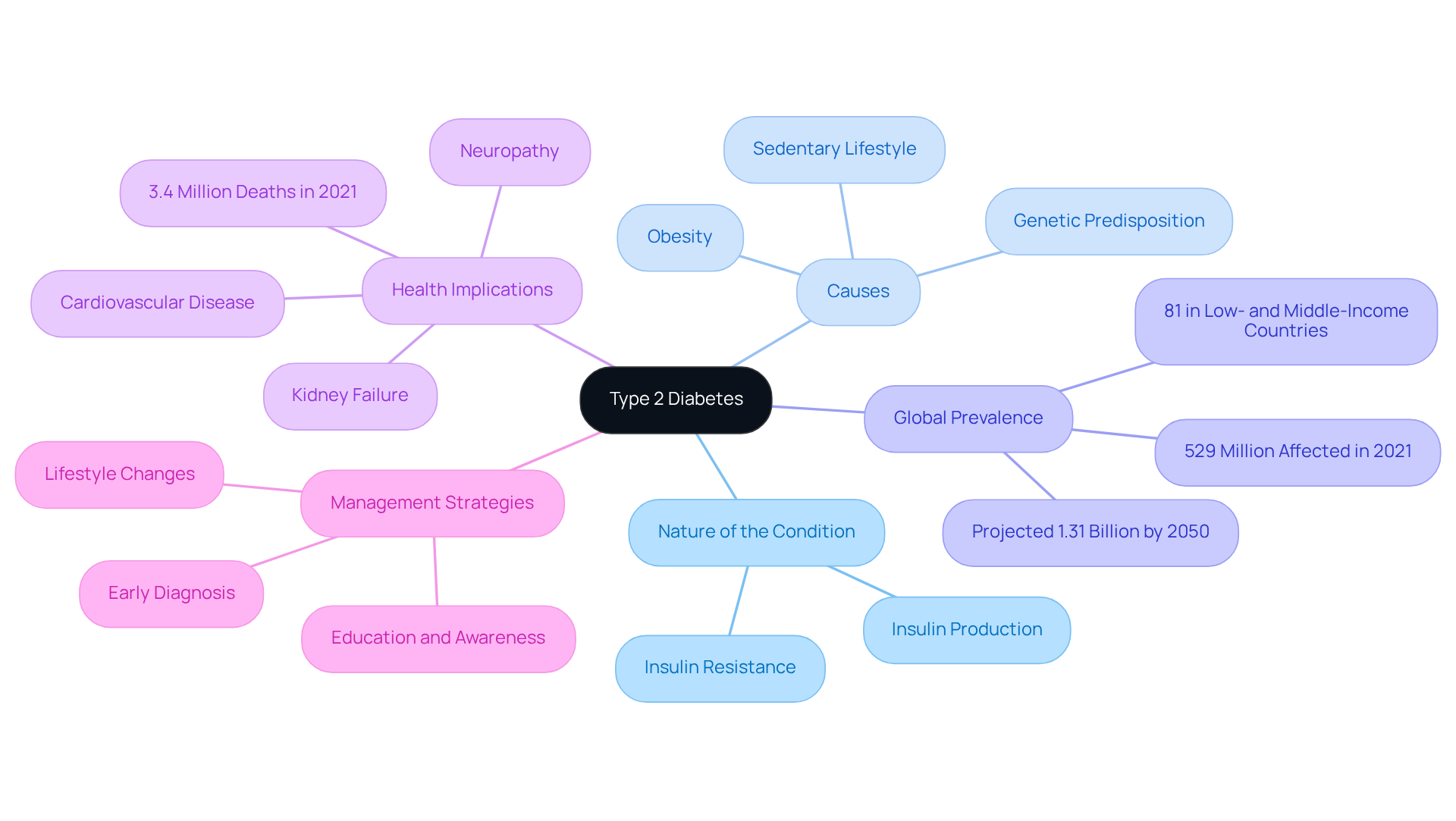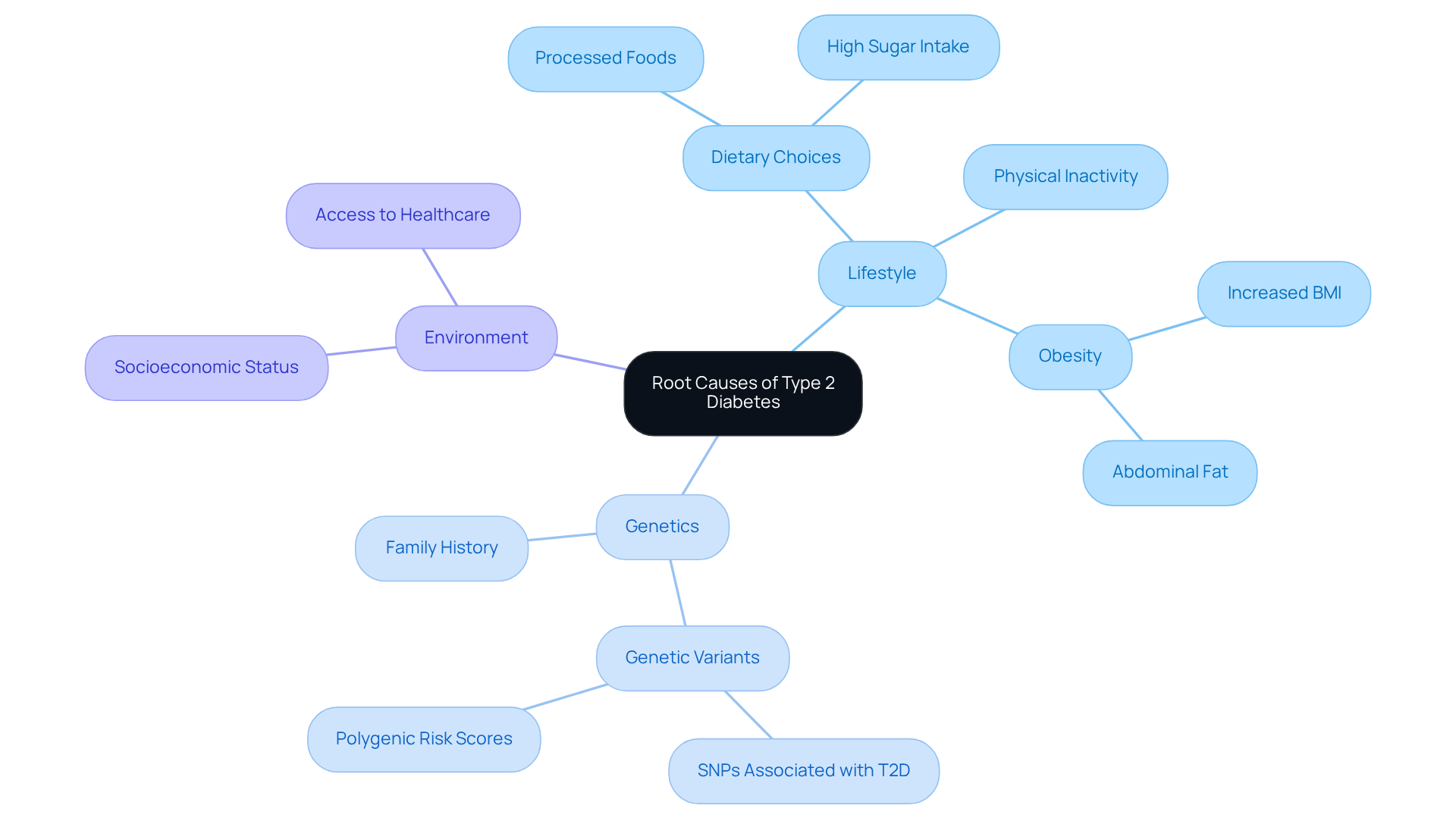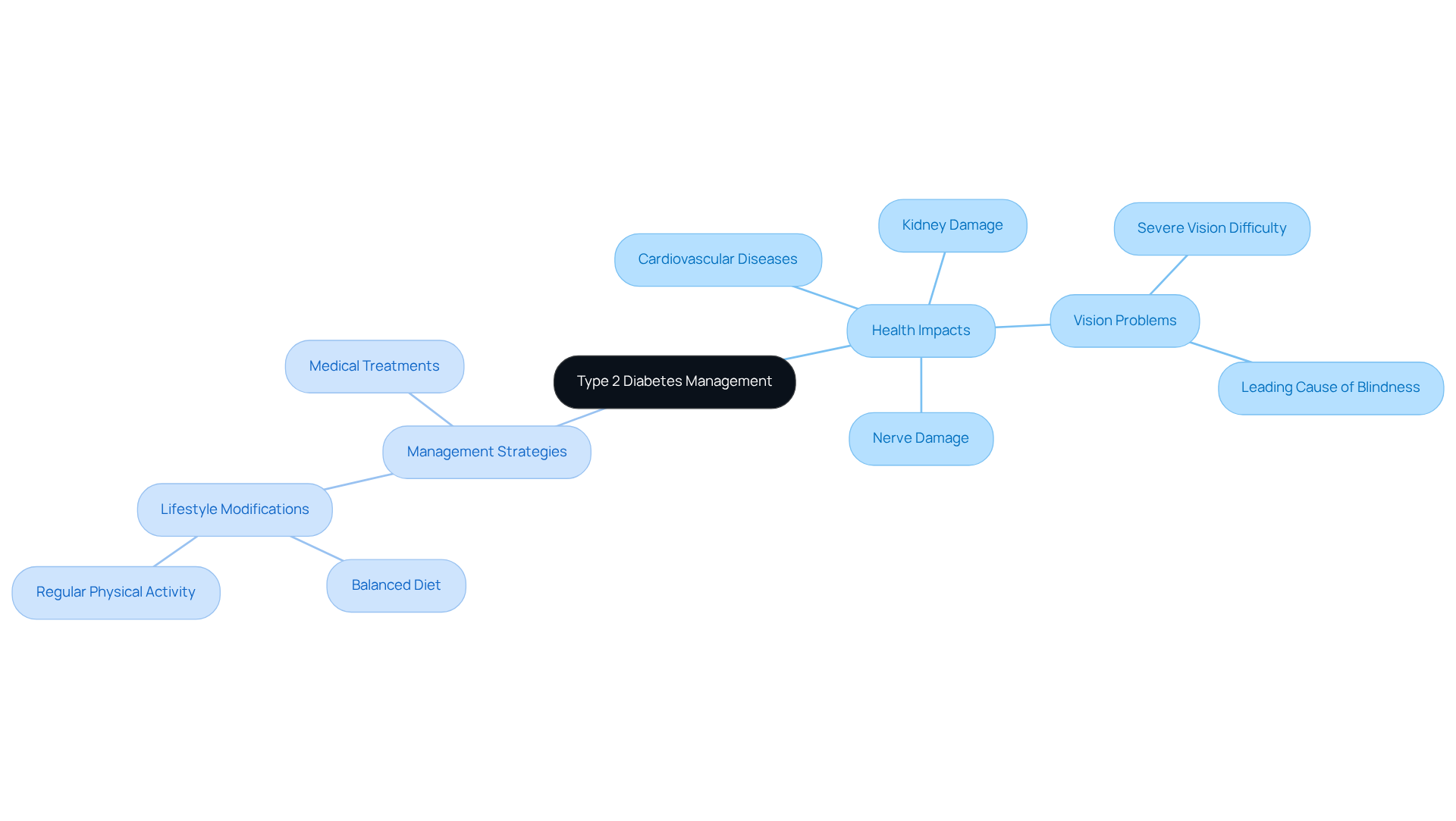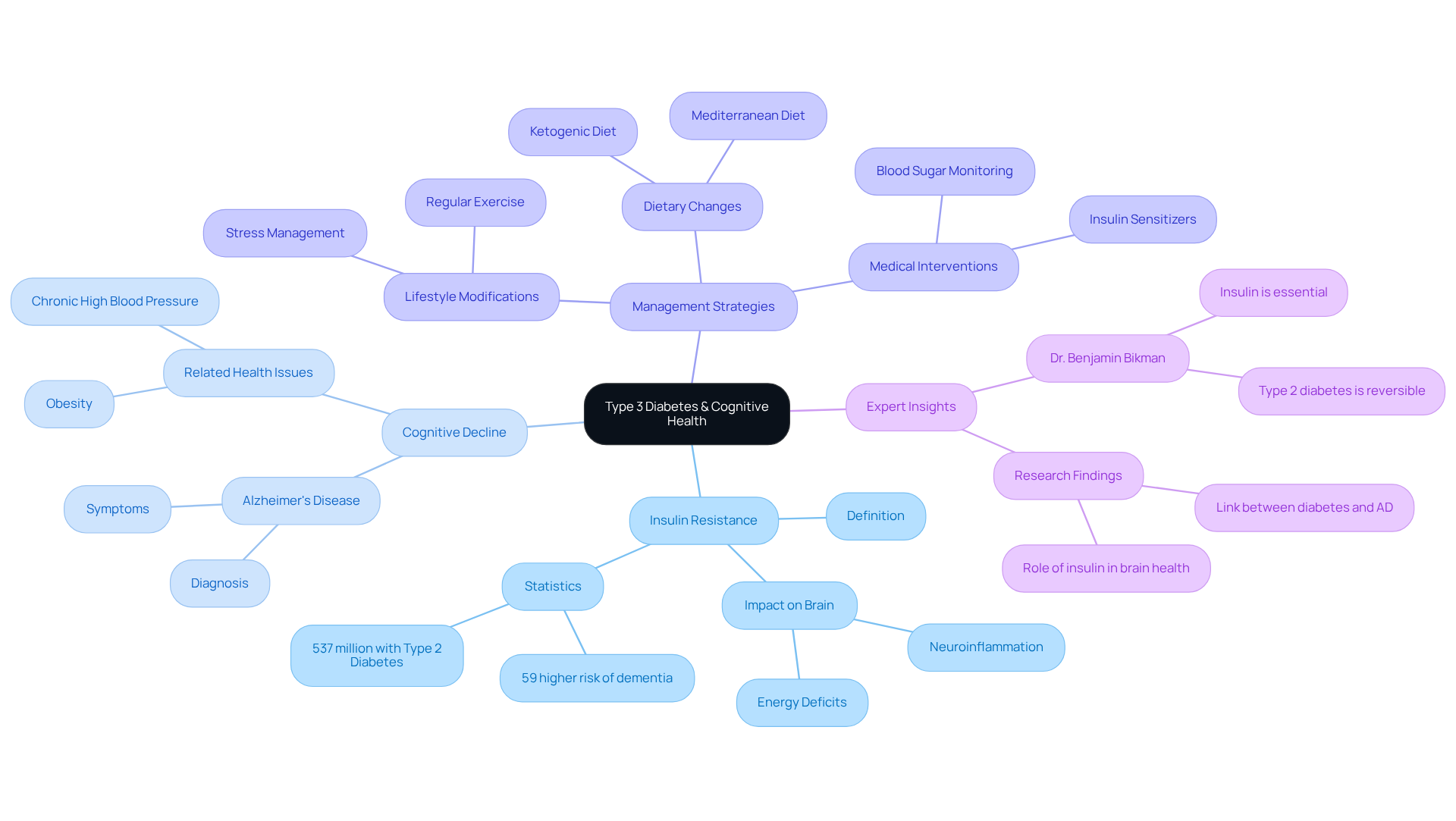Overview
The root cause of type 2 diabetes can often feel overwhelming, but understanding it is the first step toward managing your health. It primarily stems from a combination of lifestyle choices, genetic predisposition, and environmental factors. Obesity and physical inactivity play significant roles, and it's important to recognize how these elements can impact your well-being.
Many people find that poor dietary habits and a family history of diabetes increase their risk. If this sounds familiar, know that you’re not alone in this journey. Early intervention and lifestyle modifications can make a meaningful difference in managing the condition. It's essential to take proactive steps, and there are resources available to support you.
Remember, you have the power to make changes that can improve your health. Seeking support from healthcare professionals and connecting with others who share similar experiences can provide encouragement and guidance. You are not alone in this journey; we are here to support you every step of the way.
Introduction
Type 2 diabetes has emerged as a significant global health crisis, affecting over 529 million people, and it is projected to rise dramatically in the coming decades. This metabolic disorder, characterized by insulin resistance and elevated blood sugar levels, is not merely a personal health issue; it carries profound implications for individuals and healthcare systems alike.
Understanding the root causes of type 2 diabetes—ranging from lifestyle choices and genetic predispositions to environmental factors—offers crucial insights for prevention and management. You're not alone in this journey, and it's understandable to feel overwhelmed by the many contributing elements.
So, how can individuals effectively navigate their risks and take proactive steps toward better health? We are here to support you every step of the way.
Define Type 2 Diabetes: Understanding Its Nature and Importance
Type 2 diabetes is a long-term metabolic condition characterized by elevated blood sugar levels due to insulin resistance and relative insulin insufficiency. Unlike type 1 diabetes, where the body cannot produce insulin, individuals with type 2 can produce it, but their bodies struggle to use it effectively. This condition often develops gradually and is linked to various risk factors, such as obesity, a sedentary lifestyle, and genetic predisposition. Understanding what is the root cause of type 2 diabetes is vital, as this condition affects millions worldwide and can lead to serious health complications if not managed appropriately.
Currently, type 2 diabetes has reached concerning levels globally, with over 529 million individuals living with the condition as of 2021. Projections suggest this number could rise to 1.31 billion by 2050. The prevalence of this condition is particularly alarming in low- and middle-income countries, where more than 81% of adults with diabetes reside, highlighting significant disparities in healthcare access and treatment options. In 2021, type 2 diabetes accounted for 96% of all diabetes cases, contributing to 3.4 million deaths that year alone. This condition is not just a personal health issue; it is a pressing global medical crisis. The World Health Organization has underscored the urgent need for effective prevention and management strategies to combat this epidemic.
Recognizing what is the root cause of type 2 diabetes is crucial, as failing to manage it properly can lead to severe complications such as cardiovascular disease, kidney failure, and neuropathy. Experts emphasize that early diagnosis and intervention can significantly enhance health outcomes. Therefore, raising awareness and providing education are essential components in addressing this growing concern. By fostering a deeper understanding of type 2 diabetes, individuals can take proactive steps toward effective management, ultimately improving their quality of life. You're not alone in this journey; we are here to support you every step of the way.

Explore the Root Causes: Lifestyle, Genetics, and Environment
Understanding what is the root cause of type 2 diabetes can feel overwhelming, but it’s important to know that you’re not alone in this journey. The factors contributing to this condition are intricate and multifaceted, primarily influenced by lifestyle choices, genetic predisposition, and environmental elements. Poor dietary choices, physical inactivity, and obesity play significant roles. Diets rich in processed foods and sugars can lead to weight gain and insulin resistance, which are essential contributors to developing Type 2 Diabetes.
Genetics also plays a crucial part in this picture. If you have a family history of diabetes, your likelihood of developing the condition increases significantly. Recent studies reveal that the lifetime probability of developing Type 2 Diabetes by age 45 is about 22.8% for those with low genetic predisposition, but it rises to 55.3% for individuals with a high genetic susceptibility. Genome-wide association studies (GWAS) have identified over 400 genetic variants associated with the disease, emphasizing the importance of understanding your genetic background.
Environmental factors, such as socioeconomic status and access to healthcare, also significantly affect your risk. For instance, research indicates that biological factors, particularly obesity, largely contribute to the racial disparities observed in diabetes prevalence. Black adults in the U.S. are nearly twice as likely to develop Type 2 Diabetes compared to their white counterparts, highlighting the need for awareness and support.
Recognizing what is the root cause of type 2 diabetes is essential for developing effective prevention and intervention strategies. By addressing lifestyle choices and understanding genetic risks, you can take proactive steps to reduce your chances of developing this condition. Remember, we are here to support you every step of the way, and seeking resources or guidance can make a significant difference in your journey.

Discuss the Implications: Health Impact and Management Importance
Type 2 Diabetes Mellitus can lead to serious medical complications if not managed effectively. These complications include:
- Cardiovascular diseases
- Kidney damage
- Nerve damage
- Vision problems
It's important to recognize that diabetes is the leading cause of new cases of blindness among adults aged 18-64 years. In fact, 10.1% of diagnosed individuals report severe vision difficulties or blindness.
The emotional and psychological challenges associated with this condition can significantly impact your quality of life. This makes effective management essential. A comprehensive approach is necessary, which includes lifestyle modifications like:
- Adopting a balanced diet
- Engaging in regular physical activity
Medical treatments may also be needed. For instance, individuals who participate in organized diabetes prevention programs often report improved wellness and a decrease in complications.
Timely intervention and ongoing education play a crucial role in preventing these complications. The NHS Prevention Programme has successfully engaged over 78,000 individuals to date, demonstrating the effectiveness of proactive management. Endocrinologists emphasize that taking charge of your health not only reduces challenges but also enhances overall well-being. Remember, you’re not alone in this journey; we are here to support you every step of the way.

Introduce Type 3 Diabetes: Connections to Cognitive Health
At T2DSolutions, we are dedicated to providing valuable resources to help you understand the complex relationship between the third type of diabetes and cognitive decline, particularly Alzheimer's disease. Research shows that insulin resistance in the brain significantly contributes to neurodegenerative processes, leading to cognitive impairment. As of 2024, approximately 537 million individuals worldwide are living with the second form of diabetes, raising the important question of what is the root cause of type 2 diabetes, a condition closely linked to an increased risk of developing Alzheimer's disease. In fact, individuals with this condition face a 59% higher risk of dementia compared to non-diabetics, highlighting the importance of understanding what is the root cause of type 2 diabetes.
Understanding the third type of diabetes is vital for managing blood sugar levels, not only for physical health but also for cognitive function. Impaired insulin signaling in the brain can result in the buildup of beta-amyloid plaques and tau tangles, which are hallmarks of Alzheimer's disease. Neurologists emphasize that grasping this relationship is essential for creating effective prevention and treatment strategies. As Dr. Benjamin Bikman states, 'What is the root cause of type 2 diabetes is absolutely reversible,' which highlights the potential for dietary and lifestyle changes to improve both metabolic and cognitive health.
Recognizing Type 3 Diabetes as a key factor in cognitive decline encourages further research and awareness in managing diabetes and promoting cognitive wellness. It emphasizes the connection between metabolic health and brain function. At T2DSolutions, we strive to be a leading resource in this area, offering information and support for those affected by diabetes and its cognitive implications. Additionally, chronic high blood pressure is a risk factor that can worsen cognitive decline, further stressing the need for comprehensive management of these intertwined health issues.
You're not alone in this journey. We are here to support you every step of the way.

Conclusion
Type 2 diabetes is a complex condition that affects many individuals, stemming from a blend of lifestyle choices, genetic factors, and environmental influences. It's essential to understand the root causes of type 2 diabetes, as this knowledge is vital for effective prevention and management. This condition poses significant risks to your health and well-being. By recognizing the intricate interplay between these factors, you can navigate your health journey more effectively and take proactive steps to reduce your risk.
This article explores several key arguments surrounding type 2 diabetes, shedding light on alarming statistics regarding its global prevalence and the serious health complications that can arise if left unmanaged. Early diagnosis and intervention are crucial, as well as making lifestyle changes like adopting a balanced diet and engaging in regular physical activity. Additionally, the connection between type 3 diabetes and cognitive health highlights the broader implications of managing diabetes effectively.
Ultimately, addressing the root causes of type 2 diabetes is not just an individual concern but a collective responsibility. It requires awareness, education, and support from all of us. As the number of individuals affected by this condition continues to rise, it’s imperative to foster a deeper understanding of its risk factors and management strategies. By taking informed actions and seeking resources, you can significantly improve your health outcomes and contribute to a healthier future for everyone. Remember, you're not alone in this journey; we are here to support you every step of the way.
Frequently Asked Questions
What is type 2 diabetes?
Type 2 diabetes is a long-term metabolic condition characterized by elevated blood sugar levels due to insulin resistance and relative insulin insufficiency. Unlike type 1 diabetes, individuals with type 2 can produce insulin, but their bodies struggle to use it effectively.
What are the main risk factors for developing type 2 diabetes?
The main risk factors for developing type 2 diabetes include obesity, a sedentary lifestyle, and genetic predisposition.
How prevalent is type 2 diabetes globally?
As of 2021, over 529 million individuals were living with type 2 diabetes, and projections suggest this number could rise to 1.31 billion by 2050.
Which populations are most affected by type 2 diabetes?
The prevalence of type 2 diabetes is particularly alarming in low- and middle-income countries, where more than 81% of adults with diabetes reside.
What percentage of diabetes cases does type 2 diabetes account for?
Type 2 diabetes accounted for 96% of all diabetes cases in 2021.
What are the potential health complications of unmanaged type 2 diabetes?
Unmanaged type 2 diabetes can lead to severe complications such as cardiovascular disease, kidney failure, and neuropathy.
Why is early diagnosis and intervention important for type 2 diabetes?
Early diagnosis and intervention can significantly enhance health outcomes for individuals with type 2 diabetes.
What role does education play in managing type 2 diabetes?
Raising awareness and providing education are essential components in addressing type 2 diabetes, helping individuals take proactive steps toward effective management and improving their quality of life.



